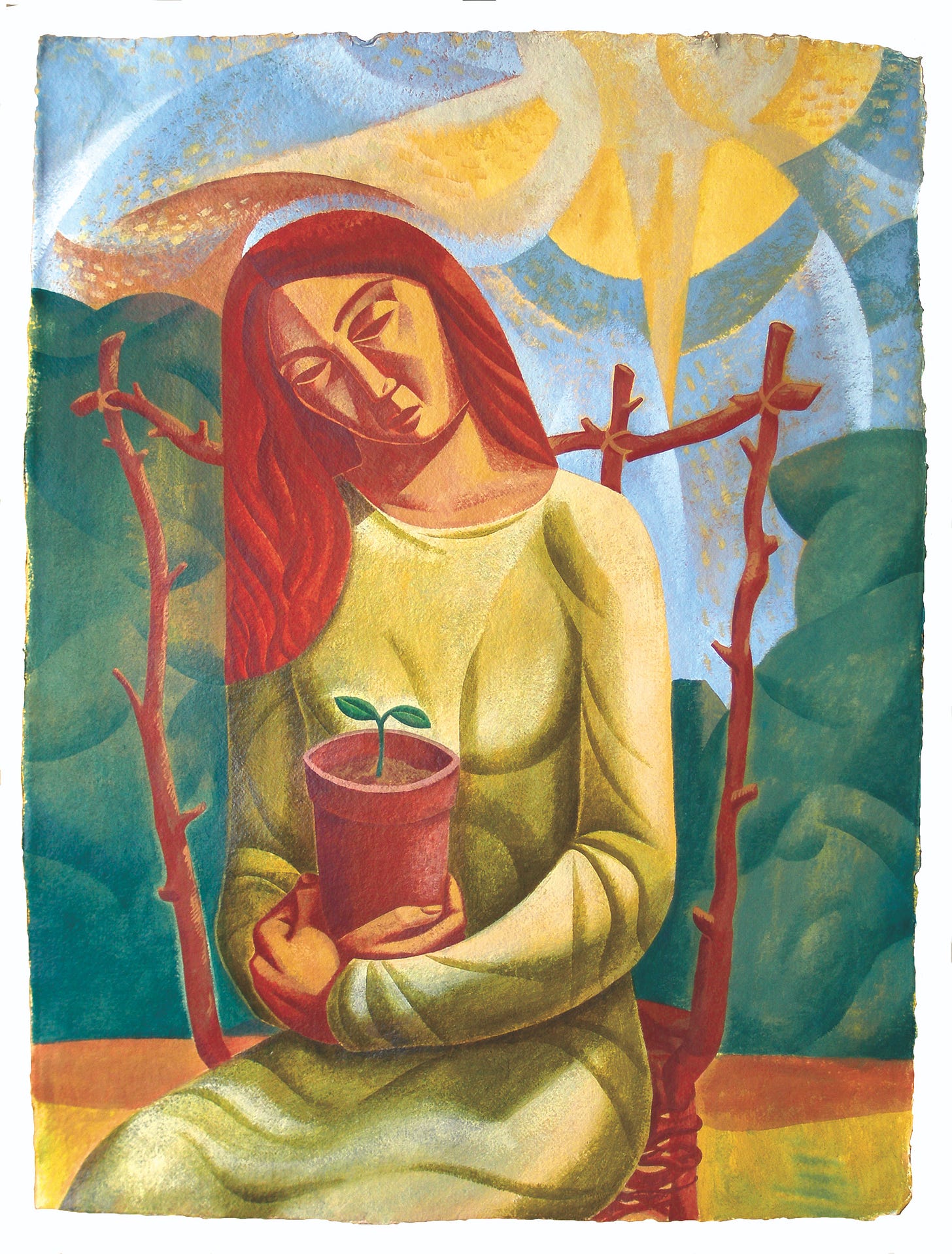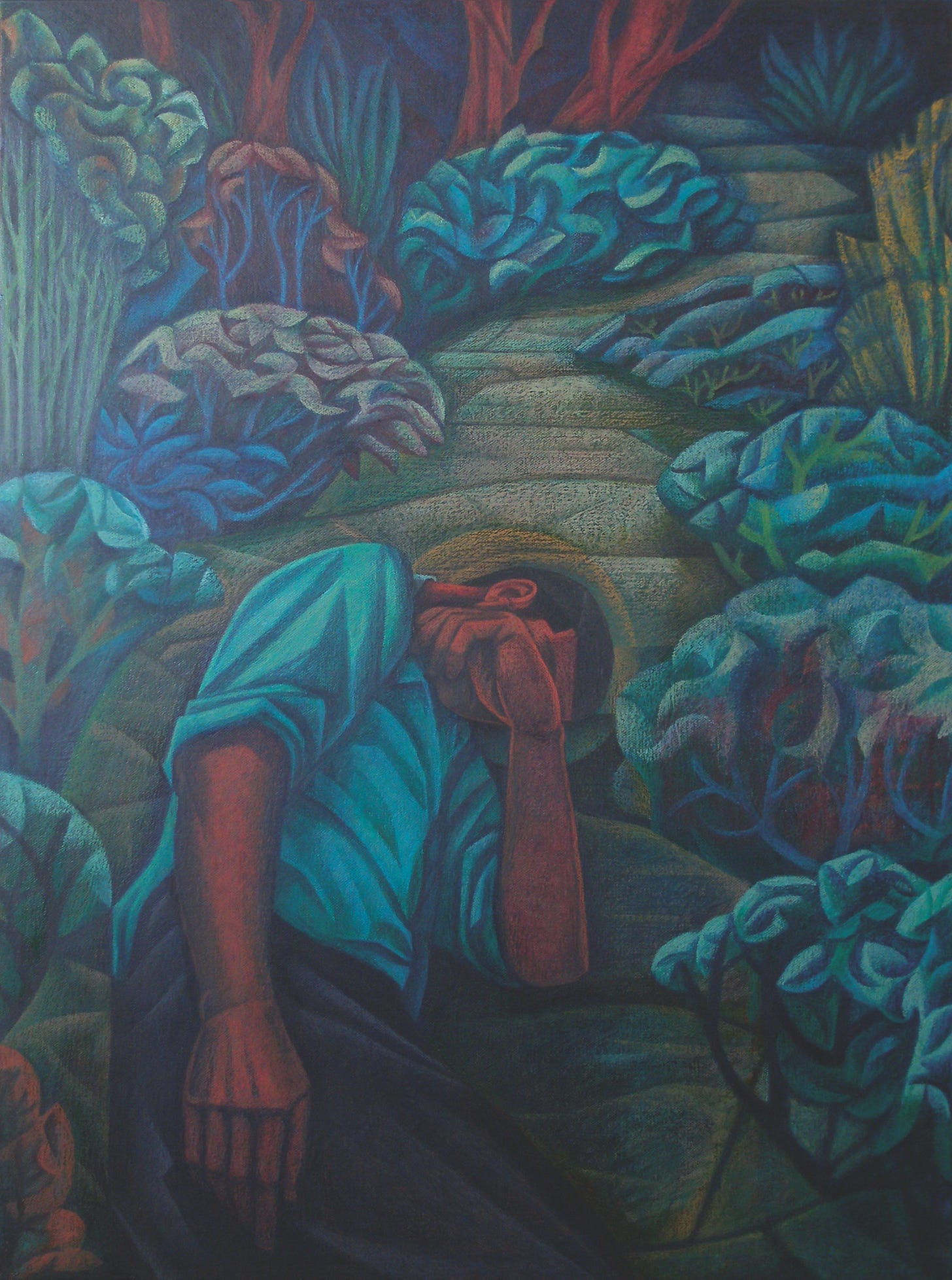Two Trips up the Mountain
Transactional Law & the Law of Love
In my walk with God, I find the law of love to be quite simple: loving others as God loves them, seeking their healing, expecting nothing in return. In sports, business, church, politics, at home—the fundamentals of the Restoration apply: Heavenly Parents, the fact that we are all divine and we're here together to learn and grow, and that Christ came to save and to heal. But the way we use those fundamentals to chew on the issues of life often ends up being transactional.
So much of what we do is in transaction. I often think about Moses's two trips up the mountain. The first trip up the mountain, God gave him the higher, holier work: the law of healing, which is really the law of love. The selfless act of loving is the higher, holier way. Moses took it down to the camp of Israel, and then he saw what was going on with Aaron and the golden calf. Moses said to himself, I don't think this is going to work. And so he went back up the mountain.
I appreciate that second trip up the mountain, because God gave Moses the transactional law, thinking, We've got to start somewhere. God wants a relationship with us. When God saw what was going on with the Israelites, God thought, I know the experience of humanity, and I know that they're in an entropic environment, where everything rots and decays. Let's try something that is more intuitive. Let them do things for credit. Let them do things that make them feel special.
God's intention in revealing the law was to build a relationship with us, because God wants us close. God wants intimacy with us. So on the second trip up the mountain, God gave Moses a set of things to do that would build a sacred transactional relationship.
But at its root, transaction can't last in this entropic world where everything decays. That's why Moses's second trip brought back a preparatory, transactional law. We love transaction because we love feeling special. If I'm going to sacrifice in a high-demand religion that asks so much of me, human nature says, well, then I want credit. Tell me it's for a purpose, even if it's a heavenly purpose.
I spent my early years doing homework listening to Saturday's Warrior. I found great meaning in that principle: the idea that I was here on God's errand, and I was important and useful and I could be special. A lot of my life was spent doing things to earn that moniker of being a Saturday's warrior. It was a great profit for me, and I was very grateful. It defined my spiritual life. I think that that's true for so many of us: we want to do good. Like, God, tell me what to do, and I'll have it done by 10 a.m., and I'll have a Jell-O pudding pie ready to go by noon. I can do it. We are the can-do people. And so we take Moses's second trip up the mountain with him: God telling us what to do and we do it, in a sacred relationship.
I don't want to diminish that relationship. It's just that the relationship can't last, because it's about me. That relationship is self-interested at its root, and self-interest rots over time. In the specialness of it, the accomplishment, we separate from others, because if I'm a Saturday's warrior, well, sorry, maybe you're not. So God is asking for a relationship that God knows can't last, but wants it as a beginning that is intuitive to us.
As we have taken that second trip up the mountain with Moses and come back with a transactional law, we have made it our religion, which I do not believe was the intent. I think Christ came to fulfill that law. A good friend recently wrote to me that the law of Moses became 613 laws that actually served to corrupt the practice of their religion. Look what this law paradigm did. Paul lived it fully, but it made him small and judgmental and angry. His encounter with Jesus changed everything because it introduced him to God's love. Then Paul said, in effect, there's no way all these rules are flowing from God's love. They're actually distracting us from God's love because we view them as transactions with a distant God who is easily offended by sin and must be appeased.
I think it's important that we recognize that both trips up the mountain by Moses have different paradigms, different languages, and different actions. We see that in scripture. I can read scripture and say, That's a transactional scripture. It's still scripture, but it comes from the paradigm of Moses's second trip up the mountain. Or, conversely, There is a non-transactional scripture. That one will last. That one can make it through eternity.
So we ask ourselves, how much of my relationship with heaven is based on a transactional relationship? I was with my stake president one day when we were talking about this, and he stopped and thought about it. He said, “You know, sadly, I think most of my relationship with heaven is transactional, and it doesn't feel good.”
I think that's an important vulnerability, recognizing that we don't have it all figured out. It's highly complex, as it's meant to be. We need to be vulnerable enough to see when we've messed up and made a mistake.
What would I tell my kids if I could have them learn one thing in life? It is to have that sacred round of forgiveness. If they've made a mistake, apologize, and then go fix it. And in that selfless effort to go fix it is the irony of our lives, because in that is the full measure of heaven.
In considering transactional relationships rotting over time in self-interest, I wonder, what is the far end of transactional relationships? They take us to fundamentalism and perfectionism—things that can be very, very dastardly. With that in mind, we recognize that we cannot travel that road forever. But we can begin by using it to build a relationship, starting with the transactional idea that if I'm perfect, God will bless me with abundance. That sacred transactional relationship with God results in intimacy, proximity, and a measure of spirit—all beautiful, wonderful things that lead us past transaction and deeper into a relationship with heaven.
In church, you can start to see how the water can be muddied by transaction. You hear talks that are very transactional, and you hear talks that are very nontransactional. It's important for all of us to recognize the difference between Moses's two trips up the mountain. I can be grateful for both by putting them in their proper place. As I mentioned, self-interest cannot stand forever. I firmly believe that there are perpetual places in the universe, governed by a perpetual law, which cannot be a law of transaction.
Now we need to mature into a higher, holier work. It starts by recognizing that in the doing, we're not getting to the places we want to be. It's not the doing, but the being: living the four qualities of long-suffering, gentle persuasion, meekness, and love unfeigned.
Someone in my Sunday School class said, “Well, then what do we do? Because we're the can-do people, right? Like, how do I do it?” And I said, “Well, actually, there's not anything to do. There's just things to be.” And in the being is where the magic of the ironies of God's love are. I started to be these four qualities in my relationships at home, at work, on the street. If I was going to speak the language of long-suffering, what would that language be? If I was going to act in a way that was gentle persuasion, what would that look like?
Through meekness, the ability to be vulnerable, and the promise of Moroni 7 (the pure love of Christ), we can actually see other human beings with transfigured eyesight and see their eternal potential. Not in the moment of today, with the choices they have made in this crazy world, but their eternal potential. That is the higher, holier work of Moses's first trip up the mountain and for the thousands of years since.
I think God has asked us to leave behind a transactional relationship with Him and with Her, and to move forward in a relationship guided by this principle of eternal love. You can't conflate the two paradigms. The law of love is supreme, and then all other laws of God come as an invitation, because there is no coercion in the gospel of Jesus Christ. Christ's outstretched hands are always eternally inviting forward. In that being, we can transition to changing the world.
It is a selfless act to try to see another human in their fullness, their beauty, their faith to take a body to come to this earth, in the divinity of all of us together, seeking others' healing as we bounce around together, and losing ourselves in that effort. Because “God is love.” And in that love, we can see others and we can heal.
Christ came to save and heal. I can't help with the saving. I would love to save my children. Every day I think about how I wish I could save them, and I can't do it. All I can do is model for them. I can't even tell them what to do at this point. I'm grateful for the Savior, who can do that saving work.
But Christ can't do the healing part of His mission without us. We are “little s” saviors on Mount Zion. We are the ones that can interject into our relationships this spirit of selfless love and healing effort. And in that intention, the Atonement of Jesus Christ can work.
The other person in the relationship can completely reject me. They might even attack me. But as my boat leaves the harbor every day, my intention is towards love and healing. Even over the hardest things, a connection can be made and healing can happen in this selfless effort.
As I said in my book,
So this is my personal path forward. With the law of love as my guiding light, my steely foundation of faith, I can stare into the enormity of human foibles. From polygamy, racism, difficult issues in Church history, sexism, queerphobia, to anything else that can destabilize my relationship to the institutional Church, I can stare at it, chew on it, and own it. I can find the grace to manage through it without flinching. It can be devastatingly heavy and painful, but I can go back to the fundamental message of the Restoration, which is this: every single person on earth has a divine heritage from loving Heavenly Parents who knew us before; They have a plan for our growth on this earth; and Christ came to heal us and save us. . . . Every aspect of Christ's message should propel us outward to bring healing and to extend the atoning power of Christ to everyone. Every soul is rooted in faith from their very first step into mortality, and we are called to provide more space for that trajectory of faith. It's the call for each of us to rise up to Christ's message of inclusion and love.
I hope the idea of Moses's two trips up the mountain make these concepts clearer. We can grow in our ability to better see the transactional verbiage that we use with our children, spouse, siblings, or family at large, and start to catch ourselves beforehand.
In fact, my wife will many times say, “Steve, that is not the law of love.” And I think, You're right. That is not the language of the law of love, nor the spirit of the law of love. That can happen almost daily. I got into a conflict yesterday with my daughter, and I finished that little conflict thinking that I did not use the language of the vital things that are most important in that relationship.
As we chew on this together, trying to figure it out, let's work at leaving behind transaction so that we can move forward to the higher, holier work of the law of love: loving others as God loves them, seeking their healing, expecting nothing in return.
Steve Young is a two-time NFL MVP, now president and cofounder of HGGC, a private equity firm, and founder of the Forever Young Foundation, a global charity for children, which he cochairs with his wife, Barb. He lives with his family in the San Francisco Bay area.
This essay was adapted from Steve’s Restore address.
Michael Cook is an artist living in South Derbyshire, owner of the Manger Gallery, a small atmospheric gallery specialising in imaginative and spiritual artwork.
KEEP READING
COME TO RESTORE!
Restore is a three-day gathering organized by Faith Matters that brings together speakers, poets, musicians, and artists to inspire, enlighten, and nourish faith. See who is speaking below and use the discount code WAYFARE for a 20% discount on registration.











Great stuff. There is a lot to chew on here. I love so much of this idea of Moses' two trips up the mountain. I love the idea of the transactional law vs. the law of love. I do see potential peril in misreading what is transactional vs. what is love. If I allow myself, I might start to think certain doctrines are transactional because they chafe and simply choose "not to pick that one up." If the children of Israel had seen the requirement for blood on the doorposts or the requirement to look upon the brass serpent as transactional, they would have been among those who perished. I think there is a lot of good here and much to learn from. Thanks, Steve Young (I feel weird saying that :) ).
Loving one's neighbor requires community. Community requires legalism. Christ placed himself in the center of community by receiving baptism from a legal administrator. He, in turn, organized community to minister the gospel. "He that receiveth my servants receiveth me".
Christ did not abolish law, he established himself as the law giver. His law is not based on tradition, letters, and scholars. It is also not based on our own selfish wills, conveniences, and desires. His law is based on revelation to his authorized servants.
Through them, he gives give us instructions for governing the church and administering the ordinances. This legalism is absolutely vital as we submit to authority. It's hard to have community without a meeting schedule, an organized hierarchy, and handbooks. This legalism is powered by our obedience to the first and second great commandments.
The only valid rejection of legalism is the hollow legalism that rejects the authority of Jesus Christ and his servants.